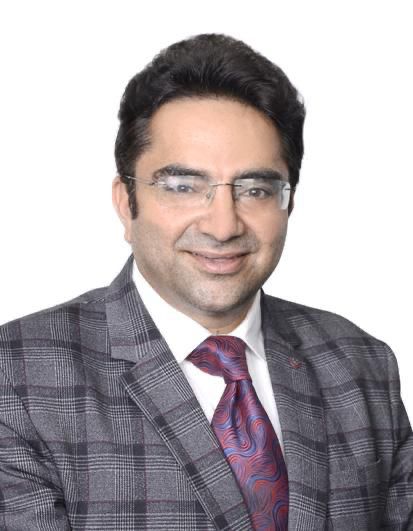| Historic balance restored — Darbar Move’s comeback marks Omar Abdullah’s commitment to equality, economic vitality, and emotional integrity of J&K | | |  Vikarm Puri Vikarm Puri
Chairman Trade and Industry, J&K National Conference
The revival of the Darbar Move under the leadership of Chief Minister Omar Abdullah stands as one of the most forward-looking and unifying administrative decisions in recent years. It reflects a government not only attuned to the emotional and historical pulse of Jammu and Kashmir but also determined to blend tradition with modernity for the larger good of its people. In reinstating this century-old practice, Omar Abdullah has demonstrated both political maturity and administrative foresight, restoring a legacy that symbolizes regional balance, inclusivity, and shared governance across the Union Territory.
From the outset, the Chief Minister made it clear that the Darbar Move is not a nostalgic return to the past but a refined, technologically advanced version of it. By incorporating digital record systems and hybrid administrative functioning, the government has ensured that efficiency and heritage can coexist. This approach reflects a new model of governance, one that respects historical continuity while embracing digital transformation. It underscores the fact that good governance in Jammu and Kashmir must be both people-centric and regionally equitable.
The decision carries profound symbolic and practical meaning. It reaffirms Jammu and Kashmir’s dual identity and restores the emotional equilibrium between its two capitals, Srinagar and Jammu. By shifting the government biannually, the administration physically brings decision-making closer to the people, ensuring that no region feels neglected or secondary. This gesture of inclusivity sends a clear message that the Omar Abdullah government is committed to balanced governance, regional fairness, and the unity of purpose that defines Jammu and Kashmir’s political spirit.
The economic benefits of this revival are equally compelling. The movement of officials, employees, and support services between the two regions generates substantial business activity. Markets, hotels, transporters, and small traders all experience a surge in demand during the Darbar sessions, injecting vitality into the local economy. Business leader Rahul Sahai rightly noted that the decision will ensure year-round economic dynamism and a more balanced distribution of commercial opportunities. For Jammu, the winter Darbar will once again bring renewed energy to trade and hospitality sectors, while in summer, Srinagar’s economy will see similar benefits. Such cyclical growth ensures that prosperity does not remain confined to one region but circulates equitably throughout the year.
Omar Abdullah’s government has also emphasized that this decision is as much about strengthening social harmony as it is about administration. The Darbar Move fosters people-to-people interaction, cultural exchange, and a sense of shared identity. As employees, officials, and families travel between Jammu and Srinagar, they carry with them not only files and documents but also experiences, relationships, and understanding. This human connectivity builds empathy, dissolves regional stereotypes, and reaffirms the social cohesion that has always been central to J&K’s identity.
Intellectuals and scholars have praised the decision as a visionary act that redefines governance as a dynamic, mobile, and inclusive process. Dr. Andareas Peter, a research scholar and political-economy analyst, described it as a “restoration of trust and confidence,” emphasizing that physical presence and shared spaces still matter deeply in a region where emotional connection underpins political stability. He noted that while technology enables governance from afar, the symbolic act of movement keeps governance human and connected. Politically, the move also signals administrative confidence and stability. It reflects a government that is not afraid to take bold, people-oriented decisions and that understands the psychological importance of continuity. In reviving a tradition that unites both regions, Omar Abdullah has reaffirmed his government’s commitment to accessibility, inclusivity, and transparency. The decision neutralizes old narratives of regional imbalance and re-establishes the principle that governance in Jammu and Kashmir must serve everyone, everywhere.
Furthermore, the Omar Abdullah administration has introduced a forward-thinking plan to make the Darbar Move eco-friendly and cost-effective. Through digital records, improved logistics, and hybrid systems, the government has modernized the process to reduce waste and environmental impact while retaining its cultural essence. This modernized version is not only efficient but also sustainable proof that tradition and innovation can coexist under thoughtful leadership. The decision has been met with widespread appreciation from business communities, civic bodies, and citizens across both regions. It has restored confidence in governance as a shared institution rather than a remote authority. The revival of the Darbar Move under Omar Abdullah’s leadership stands as a symbol of administrative resilience, cultural pride, and democratic inclusivity. It tells the people that progress need not mean the abandonment of heritage; instead, it can mean breathing new life into it.
Finally, this decision captures the very spirit of Omar Abdullah’s governance rooted in history, responsive to the present, and visionary toward the future. The Darbar Move’s return is not just the restoration of a practice but the reaffirmation of Jammu and Kashmir’s unity, economic vitality, and administrative fairness. It is a declaration that good governance travels where its people are, and that under Omar Abdullah’s leadership, the government of Jammu and Kashmir moves forward together, stronger, inclusive, and united. This historic decision is not just a moment to celebrate but a call to action for every citizen of Jammu and Kashmir. It is time for people, traders, transporters, professionals, and youth to unite behind a leadership that believes in equality, balance, and the power of progress through inclusivity. Under Omar Abdullah’s visionary guidance, J&K has chosen the path of confidence and cooperation instead of division and doubt. Let us rise together to protect our shared heritage, strengthen our economy, and move forward as one people with one purpose to build a prosperous, peaceful, and progressive Jammu and Kashmir for generations to come. |
|
